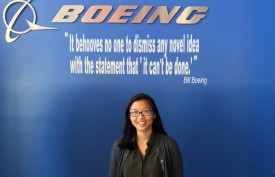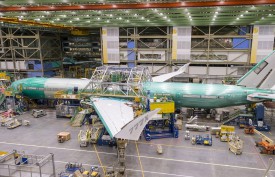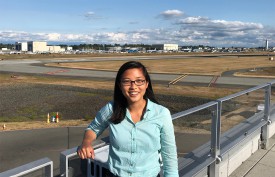When I was growing up, a common misconception that people had about engineers was that they were men who sat in cubicles all day, working on boring calculations to fix problems. Even up until my senior year in high school, I had believed this stereotype about engineers as well. The summer before my senior year in high school, I participated in a program called the New Jersey Governor’s School of Engineering and Technology (GSET), hosted here at Rutgers University. At GSET, I had the opportunity to attend college lectures, tour prominent engineering companies, and conduct research on carbon fiber composites for automotive applications. It is because of this program that I was truly able to finally understand that being an engineer means there are no limits to what you can accomplish.
Although I have not always had a clear understanding of what engineering encompasses, for as long as I can remember, I have been enchanted with airplanes and outer space, always in awe every time I flew somewhere. Therefore, it was only logical that I chose to study mechanical engineering with a concentration in aerospace here at Rutgers University. During my freshman year, I was able to build my network through the Honors College, meeting other students, professors and industry professionals. These connections led me to become involved with a research project under Professor Benaroya on inflatable and deployable structures for the Moon. As the sole researcher on the project, I gained hands-on experience in designing, testing, and analyzing inflatable habitat structures, further developing my interests in the aerospace industry.
Outside of academics, I have been heavily involved with the Society of Women Engineers (SWE) chapter here on campus, first serving as the treasurer and now the president for the second year in a row. I knew I initially wanted to join SWE to meet other female engineers and stayed in SWE because the community of students that I found there was so empowering and motivating. Female and male students alike were encouraging and supportive of everyone in the organization. More importantly, SWE has helped me develop invaluable soft skills, both professionally and personally, and has allowed me to discover my passion for STEM outreach to younger students.
All of these experiences that I gained at Rutgers prepared me for when I applied, interviewed, and was selected to work in the professional world, first as a Project Engineer Intern at Phillips 66 and most recently, as a Structures Engineering Intern at Boeing. At Boeing, I worked on stress analysis for the 777-9 airplane, a derivative of the 777 airplane that is scheduled to launch in 2020 with a larger seating capacity and composite wings. Additionally, I was able to utilize my mechanical engineering and computer science knowledge to create several Python scripts that automated and optimized the process of building virtual strain gauge indicators in the computer simulations of airframe structure that will be correlated to a large-scale physical test.
Outside of my work responsibilities, I volunteered as an Everett Professional Development Focal for REACH, planning and hosting events to engage and develop over 5,000 of Boeing’s early career employees. Following that incredible summer, I will be moving to Seattle after graduation to start my career as a part of an engineering rotational program within Boeing, called the Engineering Career Foundation Program. I am extremely appreciative of the opportunities that I have been exposed to during my four years here, because with the right support, the sky’s the limit.


